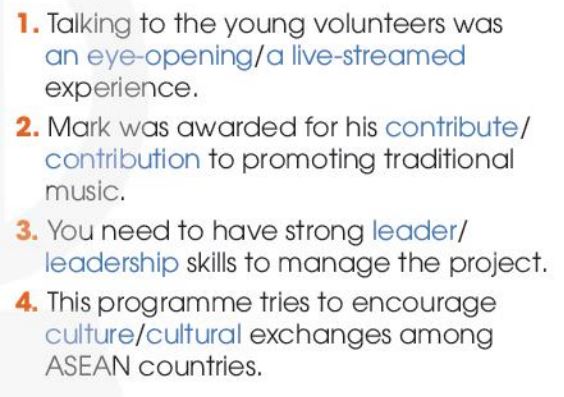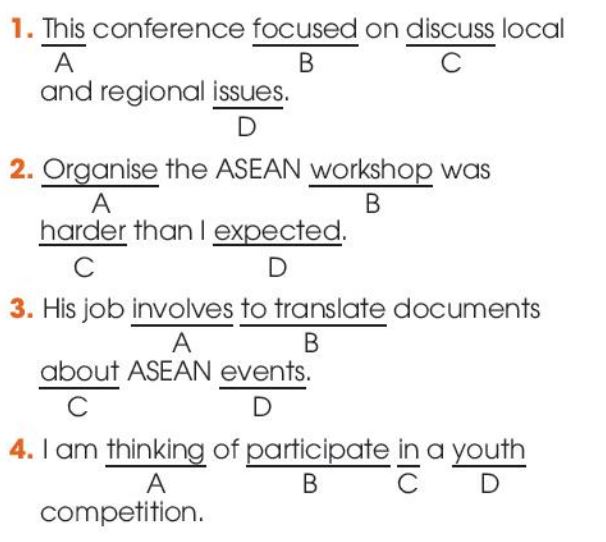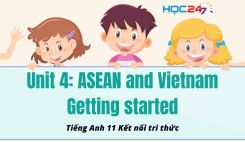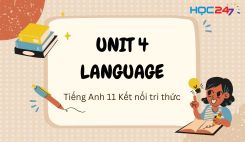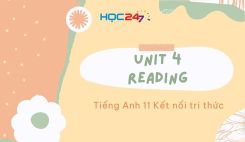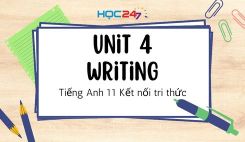B├Āi hß╗Źc k├¼ n├Āy gi├║p c├Īc em hß╗Źc c├Īch lŲ░ß╗Żc bß╗Å mß╗Öt v├Āi ├óm, ├óm tiß║┐t hoß║Ęc tß╗½ trong c├óu n├│i, ├┤n tß║Łp c├Īc tß╗½ vß╗▒ng xoay quanh chß╗¦ ─æß╗ü sß║»c m├Āu ASEAN v├Ā c├╣ng ─æiß╗ām lß║Īi nhß╗»ng cß║źu tr├║c ngß╗» ph├Īp quan trß╗Źng vß╗ü Danh ─æß╗Öng tß╗½ (Gerund); mß╗Øi c├Īc em tham khß║Żo nß╗Öi dung b├Āi hß╗Źc Unit 4 lß╗øp 11 Kß║┐t nß╗æi tri thß╗®c phß║¦n Looking Back.
T├│m tß║»t b├Āi
1.1. Unit 4 lß╗øp 11 Pronunciation
Listen and underline words with elision. Then practise saying the sentences in pairs.
(Nghe v├Ā gß║Īch ch├ón c├Īc tß╗½ vß╗øi bß╗ŗ lŲ░ß╗Żc bß╗Å. Sau ─æ├│ thß╗▒c h├Ānh n├│i c├Īc c├óu theo cß║Ęp.)
1. There are no correct answers on her test paper.
2. HeŌĆÖs going to fly to Bangkok tonight.
3. The participants were probably excited about the palace history.
4. I believe that members expressed different opinions about the issue.
Guide to answer
─Éang cß║Łp nhß║Łt
Tß║Īm dß╗ŗch
1. Kh├┤ng c├│ ─æ├Īp ├Īn ─æ├║ng trong b├Āi kiß╗ām tra cß╗¦a c├┤ ß║źy.
2. Anh ß║źy sß║Į bay ─æß║┐n B─āng Cß╗æc tß╗æi nay.
3. Nhß╗»ng ngŲ░ß╗Øi tham gia c├│ lß║Į rß║źt h├Āo hß╗®ng vß╗øi lß╗ŗch sß╗Ł cung ─æiß╗ćn
4. T├┤i tin rß║▒ng th├Ānh vi├¬n b├Āy tß╗Å ├Į kiß║┐n kh├Īc nhau vß╗ü vß║źn ─æß╗ü n├Āy.
1.2. Unit 4 lß╗øp 11 Vocabulary
Choose the correct words to complete the sentences.
(Chß╗Źn tß╗½ ─æ├║ng ─æß╗ā ho├Ān th├Ānh c├óu.)
Guide to answer
1. eye-opening (adj): mß╗¤ mang tß║¦m mß║»t / live-streamed (adj): ph├Īt trß╗▒c tiß║┐p
Talking to the young volunteers was an eye-opening experience.
(N├│i chuyß╗ćn vß╗øi c├Īc t├¼nh nguyß╗ćn vi├¬n trß║╗ l├Ā mß╗Öt trß║Żi nghiß╗ćm mß╗¤ mang tß║¦m mß║»t.)
2. contribute (v): đóng góp / contribution (n): sự đóng góp
Mark was awarded for his contribution to promoting traditional music.
(Mark ─æŲ░ß╗Żc trao giß║Żi v├¼ ─æ├│ng g├│p quß║Żng b├Ī ├óm nhß║Īc truyß╗ün thß╗æng.)
LŲ░u ├Į: Sau t├Łnh tß╗½ sß╗¤ hß╗»u "his" cß║¦n danh tß╗½.
3. leader (n): ngŲ░ß╗Øi l├Żnh ─æß║Īo / leadership (n): sß╗▒ l├Żnh ─æß║Īo
You need to have strong leadership skills to manage the project.
(Bß║Īn cß║¦n c├│ kß╗╣ n─āng l├Żnh ─æß║Īo tß╗æt ─æß╗ā quß║Żn l├Į dß╗▒ ├Īn.)
4. culture (n): v─ān h├│a / cultural (adj): thuß╗Öc vß╗ü v─ān h├│a
This programme tries to encourage cultural exchanges among ASEAN countries.
(ChŲ░ŲĪng tr├¼nh n├Āy cß╗æ gß║»ng khuyß║┐n kh├Łch giao lŲ░u v─ān h├│a giß╗»a c├Īc nŲ░ß╗øc ASEAN.)
LŲ░u ├Į: TrŲ░ß╗øc danh tß╗½ "exchange" cß║¦n t├Łnh tß╗½.
1.3. Unit 4 lß╗øp 11 Grammar
Circle the underlined part that is incorrect in each of the following sentences. Then correct it.
(Khoanh tr├▓n gß║Īch dŲ░ß╗øi phß║¦n sai trong mß╗Śi c├óu sau. Sau ─æ├│ sß╗Ła n├│.)
Guide to answer
1 - C. ŌĆ£discussŌĆØ sß╗Ła th├Ānh ŌĆ£discussingŌĆØ
This conference focused on discussing local and regional issues.
(Hß╗Öi nghß╗ŗ lß║¦n n├Āy tß║Łp trung thß║Żo luß║Łn c├Īc vß║źn ─æß╗ü ─æß╗ŗa phŲ░ŲĪng v├Ā khu vß╗▒c.)
Giß║Żi th├Łch: Sau giß╗ø tß╗½ ŌĆ£onŌĆØ cß║¦n Ving.
2 - A. ŌĆ£OrganiseŌĆØ sß╗Ła th├Ānh ŌĆ£OrganizingŌĆØ
Organising the ASEAN workshop was harder than I expected.
(Tß╗Ģ chß╗®c hß╗Öi thß║Żo ASEAN kh├│ hŲĪn t├┤i tŲ░ß╗¤ng.)
Giß║Żi th├Łch: ─Éß╗®ng trŲ░ß╗øc ─æß╗Öng tß╗½ ŌĆ£wasŌĆØ cß║¦n Ving ─æ├│ng vai tr├▓ chß╗¦ ngß╗» sß╗æ ├Łt.
3 - B. ŌĆ£to translateŌĆØ sß╗Ła th├Ānh ŌĆ£translatingŌĆØ
His job involves translating documents about ASEAN events.
(C├┤ng viß╗ćc cß╗¦a anh ß║źy li├¬n quan ─æß║┐n dß╗ŗch t├Āi liß╗ću vß╗ü c├Īc sß╗▒ kiß╗ćn cß╗¦a ASEAN.)
Giß║Żi th├Łch: involve + Ving
4 - B. ŌĆ£participateŌĆØ sß╗Ła th├Ānh ŌĆ£participatingŌĆØ
I am thinking of participating in a youth competition.
(T├┤i ─æang ngh─® ─æß║┐n viß╗ćc tham gia mß╗Öt cuß╗Öc thi d├Ānh cho thanh thiß║┐u ni├¬n.)
Giß║Żi th├Łch: Sau giß╗øi tß╗½ ŌĆ£ofŌĆØ cß║¦n Ving.
B├Āi tß║Łp minh hß╗Źa
Read the passage carefully, then choose the correct answers.
A literate population is a necessity for any nation wishing to take advantage of modern technological growth. For instance, research has shown a direct relationship between literacy among women and improved health' and child care in the family. The United Nations Educational, Scientific, and Cultural Organization (UNESCO) has long supported the concept that education must be considered an ongoing process.
Adult education has long been important in Europe, where formal programs began in the 18th century. In Britain, concern for the education of poor and working-class people resulted in the growth of adult education programs, such as the evening school and the, Mechanic's Institute, to expand education opportunities for all people: ,After the Russian Revolution, the Russian government virtually eliminated illiteracy through the establishment of various institutions and extension classes for adults.
In other areas of the world, adult education movements are of a more recent origin. In 1960, Egypt established a 'schools for the people' system designed to educate the adult population. In the 1970s, countries in Africa, Asia, and Latin America began to increase opportunities for adult education. Innovative programs involving the mass media are being used in many countries. Tanzania, for example, has used mass education techniques and the radio to organize national education programs in health, nutrition, and citizenship. In the 1980s, international educational exchange programs grew in popularity in the United States and many other countries.
1. What does this passage mainly discuss?
a. National education
b. Illiteracy eradication
c. Adult education
d. Primary education
2. It can be inferred from this passage that education ________.
a. help people to read and write
b. is an important factor in the country's development
c. is a constant process
d. must only be given to adults
3. Which of the followings is not' true?
a. Adult education has boomed in Europe in recent years.
b. Educated women know how to take care of their children properly.
c. Illiteracy is almost erased in Russia.
d. In many countries, mass education is carried out through television.
4. Which of the followings is not mentioned as means used for mass education?
a. radio
b. newspapers
c. internet
d. textbooks
5. According to the passage, adult education ________.
a. offers opportunities for promotion
b. is to educate people to improve their health
c. is popular all over the world nowadays
d. has been developed thanks to the mass media
Key (─É├Īp ├Īn)
1 ŌĆō c
2 ŌĆō b
3 ŌĆō a
4 ŌĆō d
5 ŌĆō c
Luyß╗ćn tß║Łp
3.1. Kß║┐t luß║Łn
Qua b├Āi hß╗Źc n├Āy c├Īc em cß║¦n ghi nhß╗ø nß╗Öi dung sau:
Từ vựng
- eye-opening: mß╗¤ mang tß║¦m mß║»t
- live-streamed: ph├Īt s├│ng trß╗▒c tiß║┐p
- contribute: đóng góp
- contribution: sự đóng góp
- leader: ngŲ░ß╗Øi l├Żnh ─æß║Īo
- leadership: vai tr├▓ l├Żnh ─æß║Īo
- culture: v─ān h├│a
- cultural: thuß╗Öc v─ān h├│a
Ngß╗» ph├Īp
Gerund l├Ā danh tß╗½ ─æŲ░ß╗Żc h├¼nh th├Ānh bß║▒ng c├Īch th├¬m ─æu├┤i -ing (Ving) v├Āo ─æß╗Öng tß╗½ nguy├¬n mß║½u v├Ā ß╗¤ dß║Īng phß╗¦ ─æß╗ŗnh ch├║ng ta sß║Į th├¬m not ß╗¤ ph├Ła trŲ░ß╗øc. Gerund thŲ░ß╗Øng ─æŲ░ß╗Żc gß╗Źi l├Ā danh ─æß╗Öng tß╗½.
Danh ─æß╗Öng tß╗½ c├│ thß╗ā ─æß╗®ng ß╗¤ c├Īc vß╗ŗ tr├Ł:
- ─Éß╗®ng ─æß║¦u c├óu l├Ām chß╗¦ ngß╗»
- ─Éß╗®ng sau ─æß╗Öng tß╗½ l├Ām t├ón ngß╗»
- ─Éß╗®ng sau to be l├Ām bß╗Ģ ngß╗»
- ─Éß╗®ng sau giß╗øi tß╗½ v├Ā li├¬n tß╗½
- ─Éi sau mß╗Öt sß╗æ ─æß╗Öng tß╗½/ danh tß╗½/ t├Łnh tß╗½ nhß║źt ─æß╗ŗnh
3.2. B├Āi tß║Łp trß║»c nghiß╗ćm Unit 4 - Looking back
NhŲ░ vß║Ły l├Ā c├Īc em ─æ├Ż xem qua b├Āi giß║Żng Unit 4 - Looking back chŲ░ŲĪng tr├¼nh Tiß║┐ng Anh lß╗øp 11 Kß║┐t nß╗æi tri thß╗®c. ─Éß╗ā cß╗¦ng cß╗æ kiß║┐n thß╗®c b├Āi hß╗Źc mß╗Øi c├Īc em tham gia b├Āi tß║Łp trß║»c nghiß╗ćm Trß║»c nghiß╗ćm Unit 4 lß╗øp 11 Kß║┐t nß╗æi tri thß╗®c Looking Back - Luyß╗ćn tß║Łp.
-
- A. has been living
- B. was living
- C. had been living
- D. lives
-
- A. developed
- B. have developed
- C. had developed
- D. was developing
-
Câu 3:
Choose the correct answer: The lecturer recommended ______ a number of books before the exam.
- A. reading
- B. to read
- C. us reading
- D. to have read
C├óu 4-10: Mß╗Øi c├Īc em ─æ─āng nhß║Łp xem tiß║┐p nß╗Öi dung v├Ā thi thß╗Ł Online ─æß╗ā cß╗¦ng cß╗æ kiß║┐n thß╗®c vß╗ü b├Āi hß╗Źc n├Āy nh├®!
Hß╗Åi ─æ├Īp Unit 4 - Looking back Tiß║┐ng Anh 11
Trong qu├Ī tr├¼nh hß╗Źc tß║Łp nß║┐u c├│ thß║»c mß║»c hay cß║¦n trß╗Ż gi├║p g├¼ th├¼ c├Īc em h├Ży comment ß╗¤ mß╗źc Hß╗Åi ─æ├Īp, Cß╗Öng ─æß╗ōng Tiß║┐ng Anh HOC247 sß║Į hß╗Ś trß╗Ż cho c├Īc em mß╗Öt c├Īch nhanh ch├│ng!
Ch├║c c├Īc em hß╗Źc tß║Łp tß╗æt v├Ā lu├┤n ─æß║Īt th├Ānh t├Łch cao trong hß╗Źc tß║Łp!
-- Mod Tiß║┐ng Anh 11 Hß╗īC247


